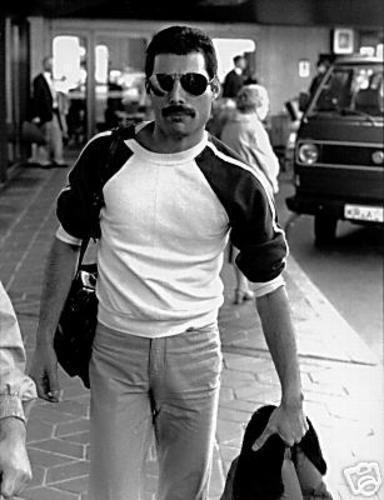Freddie Mercury, the iconic frontman of Queen, remains one of the most celebrated figures in music history. Known for his powerful voice, magnetic stage presence, and unparalleled charisma, Mercury's legacy continues to inspire generations of fans and musicians alike. His life was a fascinating journey filled with triumphs, challenges, and unforgettable performances that redefined rock music. This article delves into some untold stories and legendary moments from Freddie Mercury's career, shedding light on what made him an enduring symbol of artistry and innovation.
Beyond his dazzling performances, Freddie Mercury’s personal life was equally intriguing. From his close friendship with Mary Austin to his complex relationship with his roots in Zanzibar, Mercury’s story is rich with layers of emotion and depth. His ability to connect with people through music transcended boundaries and left an indelible mark on popular culture. As we explore these aspects of his life, we gain a deeper understanding of the man behind the legend, whose contributions continue to resonate across the globe.
From Farrokh Bulsara to Freddie Mercury
Born as Farrokh Bulsara on September 5, 1946, in Stone Town, Zanzibar, Freddie Mercury’s early life laid the foundation for his extraordinary journey. Growing up in a Parsi family, young Farrokh developed a passion for music at an early age. His parents, Bomi and Jer Bulsara, encouraged his interests, allowing him to pursue piano lessons and nurture his talent. These formative years instilled in him a love for melody and rhythm that would later define his style as a performer.
Moving to England during his teenage years, Farrokh embraced Western influences while retaining elements of his cultural heritage. It was during this period that he adopted the stage name Freddie Mercury, symbolizing both his transformation and ambition. The choice of the name reflected his desire to soar above convention and create something unique in the world of music. This decision marked the beginning of his ascent to stardom, setting the stage for his future as the charismatic leader of Queen.
Mercury’s transition from Farrokh to Freddie was more than just a change in identity; it represented a metamorphosis into an artist unafraid to experiment and push boundaries. With his newfound persona, he began building connections within London's vibrant music scene, eventually forming Queen with Brian May, Roger Taylor, and John Deacon. Together, they embarked on a mission to revolutionize rock music, creating sounds that captivated audiences worldwide.
A Lifelong Bond: Freddie Mercury and Mary Austin
Mary Austin played a pivotal role in Freddie Mercury’s life, serving as both his fiancée and lifelong confidante. Their relationship began in the late 1960s when they met through mutual friends, quickly blossoming into romance. Despite their eventual decision not to marry, Mary remained one of Freddie’s closest companions throughout his life. She provided unwavering support during challenging times and celebrated his successes alongside him.
After parting ways romantically, Freddie and Mary maintained a deep friendship rooted in trust and mutual respect. In interviews, Freddie often referred to Mary as his only friend, highlighting the significance of their bond. Even after his diagnosis with AIDS, Mary stood by him, ensuring he received proper care and comfort in his final days. Her devotion exemplified the strength of their connection, proving that true friendships can endure beyond romantic ties.
Today, Mary Austin continues to honor Freddie’s memory by preserving his legacy. She has shared anecdotes about their time together, offering insights into his personality and creative process. Through her reflections, fans gain a glimpse into the private side of Freddie Mercury, revealing a man who valued loyalty and cherished meaningful relationships.
A Voice Like No Other
As the lead vocalist of Queen, Freddie Mercury possessed a vocal range and technique that set him apart from other singers of his era. Spanning over four octaves, his voice combined power, agility, and emotional depth, captivating audiences around the world. Over the years, many have attempted to analyze and understand the intricacies of his singing style, yet few have managed to replicate its magic.
In a detailed video analysis, experts examined various aspects of Mercury’s technique, including his use of head voice, falsetto, and chest voice. They noted how he seamlessly blended these registers to produce dynamic performances, enhancing the emotional impact of each song. Additionally, his ability to adapt his tone depending on the context demonstrated his versatility as an artist.
Freddie’s influence extends far beyond Queen’s discography. Countless contemporary artists cite him as a major inspiration, crediting his innovative approach to vocals for shaping modern music trends. By pushing the limits of traditional singing techniques, Freddie Mercury cemented his status as one of the greatest vocalists in history, leaving an indelible mark on the industry.
Zanzibar: A Landmark in Freddie’s Journey
Few realize the profound impact Zanzibar had on shaping Freddie Mercury’s identity and worldview. Born in this East African archipelago, Freddie spent his early childhood surrounded by diverse cultures and traditions. Although conservative Muslim society initially posed challenges for him, Zanzibar also offered opportunities for exploration and self-discovery. These experiences enriched his perspective, influencing his artistic expression later in life.
Despite spending much of his adult life abroad, Freddie never forgot his Zanzibari roots. He occasionally referenced them in interviews, expressing pride in being associated with such a distinctive place. However, his relationship with Zanzibar was complex, reflecting tensions between tradition and modernity. For instance, his flamboyant stage persona clashed with the island’s conservative values, leading some locals to view him skeptically.
Today, Zanzibar honors Freddie Mercury as one of its most famous sons. Tourists visiting the island can explore sites linked to his early life, gaining insight into the environment that nurtured his talents. By acknowledging this connection, Zanzibar celebrates not only Freddie’s achievements but also the universal appeal of his music, which continues to resonate globally.

